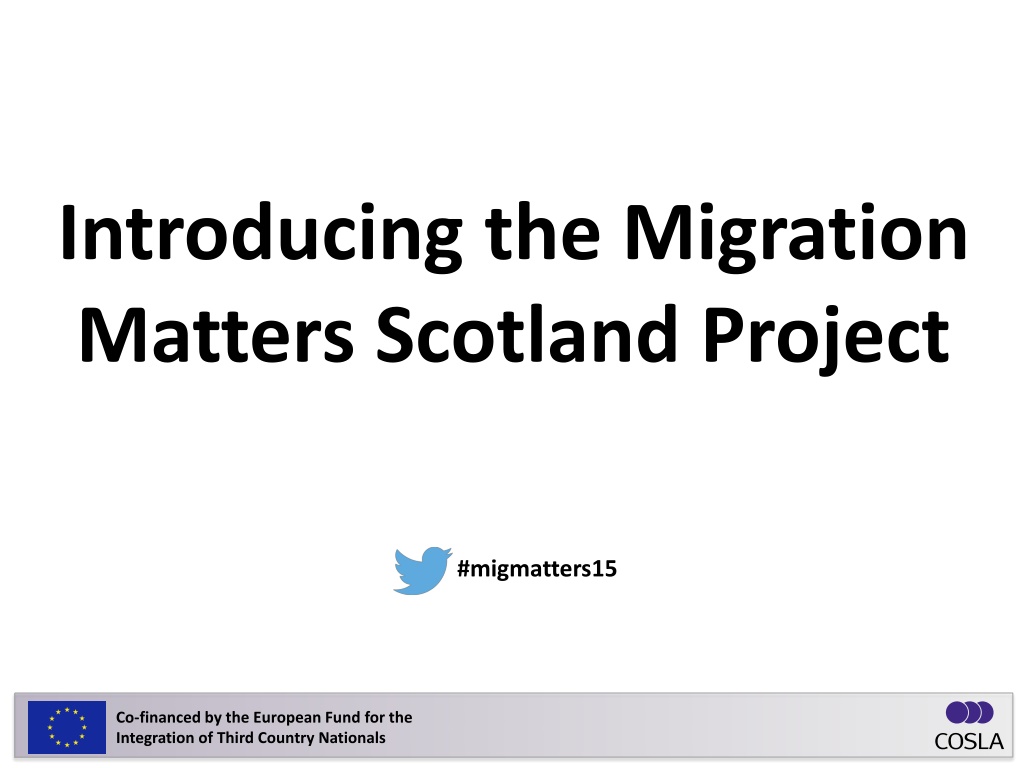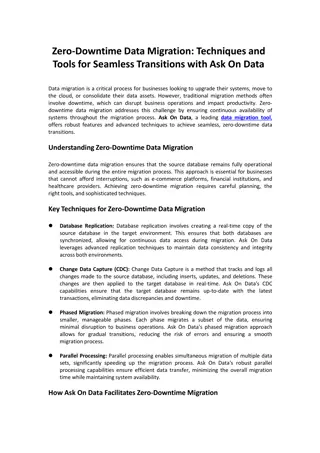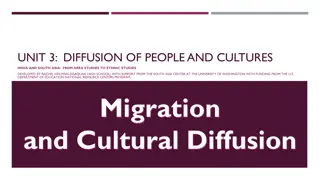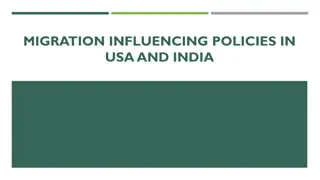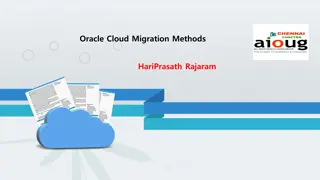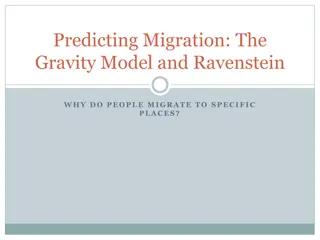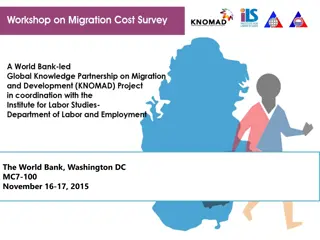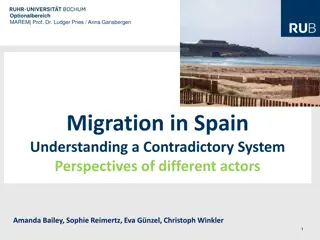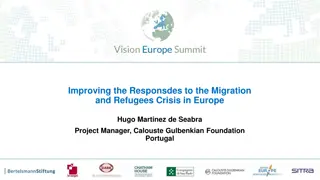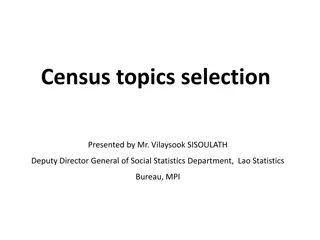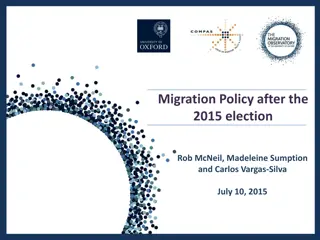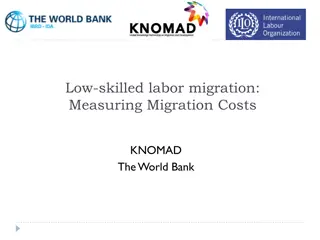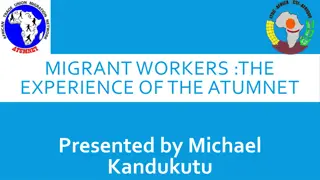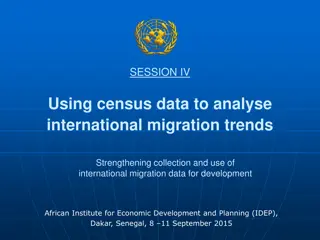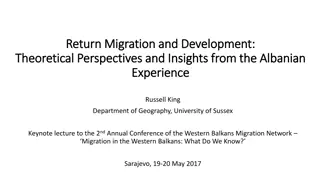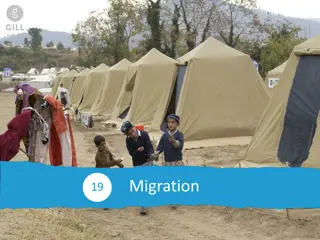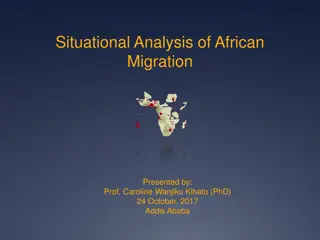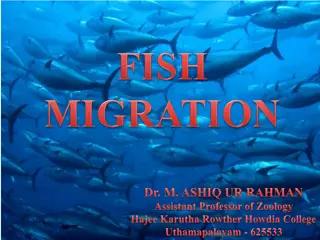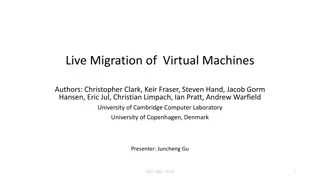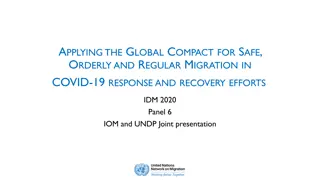Migration Matters Scotland Project Overview
The Migration Matters Scotland Project, co-financed by the European Fund for the Integration of Third Country Nationals, focuses on understanding and supporting the needs of migrants while building the capacity of local authorities. Key aims include facilitating migrant participation in policy formulation and enhancing integration strategies. The project includes various activities like developing engagement models, evaluating toolkits, and creating information-sharing databases. Pilot work is being conducted in four areas, with interviews, group discussions, and engagement activities. The project has already engaged council officers and migrants, along with various partners like the Scottish Government and healthcare organizations.
Download Presentation

Please find below an Image/Link to download the presentation.
The content on the website is provided AS IS for your information and personal use only. It may not be sold, licensed, or shared on other websites without obtaining consent from the author. Download presentation by click this link. If you encounter any issues during the download, it is possible that the publisher has removed the file from their server.
E N D
Presentation Transcript
Introducing the Migration Matters Scotland Project #migmatters15 Co-financed by the European Fund for the Integration of Third Country Nationals
Migration Matters Scotland Funded by the European Commission s European Fund for the Integration of Third Country Nationals Particular focus on the integration of non-EU nationals Project runs from December 2013 to June 2015 Co-financed by the European Fund for the Integration of Third Country Nationals
Key Aims of the Project To better understand the needs of migrants and the needs of public service bodies that design and deliver services for them; To support migrants to participate in the formulation and implementation of policies about them; and To build the capacity of local authorities and their partners to coordinate, implement, monitor and evaluate integration strategies for migrants Co-financed by the European Fund for the Integration of Third Country Nationals
Key Activities Develop, pilot and evaluate models of engagement with migrants; Evaluate COSLA s Migration Policy Toolkit and develop a new resource for local authorities and their community planning partners; Create an online database of research, policy and practice that will improve information sharing and understanding between policy makers, practitioners and researchers; Disseminate the learning from the project through national events Co-financed by the European Fund for the Integration of Third Country Nationals
Pilot Work 4 pilot areas: Edinburgh Fife Perth & Kinross Argyll & Bute 4 strands to our engagement activities Interviews with council officers Group discussions with migrants Officer / migrant engagement TODAY! Reporting back to the pilot councils Co-financed by the European Fund for the Integration of Third Country Nationals
Some Statistics We have Interviewed 18 council officers Met with 178 migrants at a total of 12 engagement events 139 of whom were Third Country Nationals 37 of whom were EU migrants Also discussed the project with partners from Scottish Government, NHS Health Scotland, National Records of Scotland, the third sector, academia and more Co-financed by the European Fund for the Integration of Third Country Nationals
Our Analysis Currently analysing all of the data from our interviews and group discussions Have categorised findings according to various service areas / themes: Education Employment Health & Leisure Housing Social Connections Co-financed by the European Fund for the Integration of Third Country Nationals
Initial Findings Migrant Engagement Generally positive about health, leisure, education and housing provision Particularly positive regarding schooling, libraries, gyms, parks BUT high demand for additional services ESOL, translation services, childcare, council housing Lack of access to tailored support and advice on service provision Crucial role for third sector community organisations in filling gaps in service provision and supporting integration Providing access to language classes, social activities, opportunities to mix with other migrants and the wider community Co-financed by the European Fund for the Integration of Third Country Nationals
Initial Findings Council Interviews Varied motivation for involvement in the pilot Wishing to attract more migrants Wishing to better understand migrants needs Wishing to give migrants a better understanding of the council s role Wishing to work more closely with migrants Recognition of key issues for migrants that were similar to those raised by migrants themselves Service and information provision Capacity issues Challenges associated with language Co-financed by the European Fund for the Integration of Third Country Nationals
Some General Observations Many of the issues raised by the migrants we spoke to are not peculiar to migrants Concerns regarding levels of service provision Lack of clarity about the role of councils Role for councils in communicating what they can and cannot do Crucial role for the third sector in supporting integration Significant funding pressures for statutory and third sector providers importance of mutual understanding about these pressures Co-financed by the European Fund for the Integration of Third Country Nationals
This Mornings Discussions Platform for dialogue between migrants and service providers Sharing experiences Asking questions To inform and be informed Gathering evidence for our feedback to the pilot councils Feeding into the development of the new policy toolkit for all councils in Scotland (more on that this afternoon!) Co-financed by the European Fund for the Integration of Third Country Nationals
How its going to work 5 x 20 minute table discussions with a 20 minute tea / coffee break after the 2nd discussion A facilitator / note-taker at each table Migrant representatives stay where they are Everyone else (council representatives, other service providers, academics) move tables every 20 minutes Those who are moving move from Table 1 to Table 2, from Table 2 to Table 3, etc. Last session slightly longer with approximately 10 minutes at the end to prioritise key messages from both a migrant s and a service provider s perspective Co-financed by the European Fund for the Integration of Third Country Nationals
